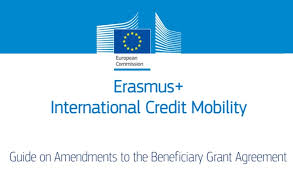
International Credit Mobility Budget 2018
By Aoileann Ní Bhroin
| Key Action 107 International Credit Mobility Budget Breakdown 2018 - Ireland Deadline for Applications - 1 February 2018 (12.00 Brussels Time) |
|---|
| Region | Amount (€) |
|---|---|
| European Neighbourhood Instrument - South | 420,078 |
| European Neighbourhood Instrument - East | 230,090 |
| Russia | 198,088 |
| Asia | 242,652 |
| Central Asia | 77,582 |
| Middle East - Iran, Iraq, Yemen | 36,429 |
| Latin America | 78,688 |
| South Africa | 22,722 |
| EDF/ACP | 79,544 |
| West Africa Trust Fund | 50,000 |
| IPA Western Balkans | 130,977 |
| USA, Canada | 85,578 |
| Industrialised Asia | 90,583 |
| Total Budget | 1,743,209 |
Some of the Main Features
Application Form link to be posted shortly
For full information – see the Programme Guide 2018
- Mobility between Programme and Partner Countries Duration: 16 or 26 months.
- Applicants have to submit their grant application by 1 February 2018 by 12:00 (midday Brussels time) for projects starting on 1 June of the same year.
- Study periods: from 3 to 12 months (including a complementary traineeship period, if planned).
- Staff Visits From 5 days from and to Partner Countries to 2 months, excluding travel time. A teaching activity has to comprise a minimum of 8 hours of teaching per week.
- A student coming to Ireland will receive €900 per month plus airfare.
- A student going to a Partner Country will receive €700 per month plus airfare.
- A staff member going to a Partner Country or coming to Ireland will receive €180 per day plus airfare
| Region | Countries |
|---|---|
| ENI South | Algeria, Egypt, Israel, Jordan, Lebanon, Libya, Morocco, Palestine, Syria, Tunisia |
| ENI East | Armenia, Azerbaijan, Belarus, Georgia, Moldova, Territory of Ukraine as recognised by international law |
| Russian Federation | Territory of Russia as recognised by international law |
| Asia | Afghanistan, Bangladesh, Bhutan, Cambodia, China, DPR Korea, India, Indonesia, Laos, Malaysia, Maldives, Mongolia, Myanmar, Nepal, Pakistan, Philippines, Sri Lanka, Thailand and Vietnam |
| Central Asia | Kazakhstan, Kyrgyzstan, Tajikistan, Turkmenistan, Uzbekistan |
| Middle East | Iran, Iraq, Yeme |
| Latin America | Argentina, Bolivia, Brazil, Chile, Colombia, Costa Rica, Cuba, Ecuador, El Salvador, Guatemala, Honduras, Mexico, Nicaragua, Panama, Paraguay, Peru, Uruguay, Venezuela |
| South Africa | South Africa |
| EDF/ACP | Angola, Antigua and Barbuda, Bahamas, Barbados, Belize, Benin, Botswana, Burkina Faso, Burundi, Cameroon, Cape Verde, Central African Republic, Chad, Comoros, Congo, Congo Democratic Republic of the, Cook Islands, Djibouti, Dominica, Dominican Republic, Equatorial Guinea, Eritrea, Ethiopia, Fiji, Gabon, Gambia, Ghana, Grenada, Guinea, Guinea-Bissau, Guyana, Haiti, Republic of Côte d'Ivoire, Jamaica, Kenya, Kiribati, Lesotho, Liberia, Madagascar, Malawi, Mali, Marshall Islands, Mauritania, Mauritius, Micronesia - Federated States of, Mozambique, Namibia, Nauru, Niger, Nigeria, Niue, Palau, Papua New Guinea, Rwanda, Saint Kitts And Nevis, Saint Lucia, Saint Vincent And The Grenadines, Samoa, Sao Tome and Principe, Senegal, Seychelles, Sierra Leone, Solomon Islands, Somalia, South Sudan, Sudan, Suriname, Swaziland, Timor Leste - Democratic Republic of, Tanzania, Togo, Tonga, Trinidad and Tobago, Tuvalu, Uganda, Vanuatu, Zambia, Zimbabwe |
| West Africa | Burkina Faso, Cameroon, Chad, Cote d’Ivoire, the Gambia, Ghana, Guinea, Mali, Mauritania, Niger, Nigeria, Senegal. |
| Western Balkans | Albania, Bosnia and Herzegovina, Kosovo, Montenegro, Serbia |
| USA, Canada | USA Canada |
| Industrialised Asia | Australia, Brunei, Hong Kong, Japan, (Republic of) Korea, Macao, New Zealand, Singapore, Taiwan |
Note on West Africa Fund (WAF)
- WAF projects should primarily benefit the African institutions and individuals. The expected results are twofold: enhanced mobility of higher education students in Africa; and reinforced capacity for West African teachers and their HEIs in managing international mobility. The focus of European staff going to Africa should be to support the mobility activities of the project by mentoring the students and providing coaching for the African HEIs.
- The EC confirms that both Incoming and Outgoing Staff Training (STT) and Staff Teaching (STA) activities are eligible.
- The EDF and WAF funds are distinct sources of funding and NAs must be able to explicitly trace both funding sources. Flows with Nigeria for instance within a single project must be funded either by EDF or by WAF but not both funding sources.
- As is the case under EDF or DCI, outgoing short, first and second cycle mobilities are not eligible under WAF.


